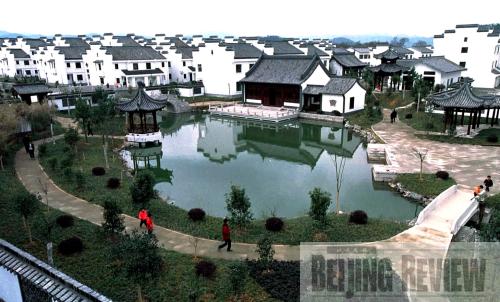Rising to new heights
 |
|
RISING VILLAGES: A park, funded by the government to provide green space in a farming community, is surrounded by traditional houses in Xinweizhuang Village in Zhejiang Province (XINHUA) |
As China made economic improvements, the need to balance economic and social development became increasingly pressing. In a report to the 12th National Congress of the CPC held in 1982, great significance was attached to improving people's livelihoods.
In December 1982, the Fifth Session of the Fifth National People's Congress changed the Five-Year National Economic Development Plan, which had been executed for 25 years, into the Five-Year Plan for National Economic and Social Development, effective from the sixth five-year plan. Since then, the government has paid close attention to both economic and social development.
From the sixth five-year plan to the 11th five-year plan, the content of social development has been refocused and extended to the fields of population, employment, social security, income distribution, health care, science and education, environmental protection, the rule of law and social management.
During the outset of the 21st century, China raised its goal of "building a moderately prosperous society in all respects." It pledged to make further progress in developing its economy, improving democracy, advancing science and education, enriching culture, fostering social harmony and improving the fabric of everyday life by 2020.
At the Third Plenary Session of the 16th CPC Central Committee in 2003, the CPC put forward the Scientific Outlook on Development, which advocates "people-oriented, comprehensive, balanced and sustainable development." In the Fourth Plenary Session of the 16th CPC Central Committee held in 2004, the Party proposed an important strategy to "build a harmonious socialist society." The Sixth Plenary Session of the 16th CPC Central Committee held in 2006 saw the passage of a resolution on major issues concerning the building of a harmonious socialist society. In the 17th National Congress of the CPC in October 2007, the Party raised the notion of "accelerating social development to improve people's livelihoods." Social undertakings, together with economic, political and cultural development, have become an integral part in building a socialist country with Chinese characteristics.
Great achievements
- Rising living standards
In the early years of the People's Republic, per-capita national income was a mere $10 to $20, the same as the level of the Western developed countries in the mid-18th century. From 1949 to 1978, Chinese people's livelihoods gradually improved along with economic development. In 1978, per-capita national income rose to $190. After China adopted the policy of reform and opening up in 1978, its national economy secured steady and fast growth, leading to rapid improvement in people's living standards. In 2008, the country's per-capita gross domestic product (GDP) soared to around $2,500, making China a lower middle-income nation.
 0
0 







